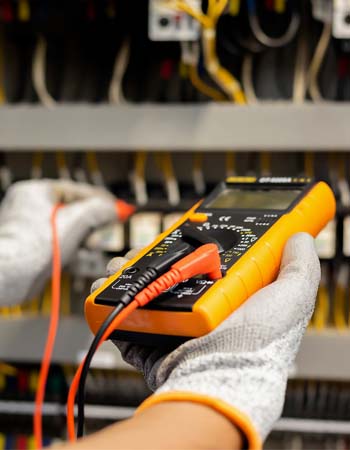We may earn revenue from the products available on this page and participate in affiliate programs. Learn More ›
A career in the trades can be extremely rewarding. The pay is good, the work is interesting, and there’s a steady demand for a variety of experts. Professional electricians are some of the highest-paid tradespeople, and their jobs evolve with new technologies, meaning their vocation rarely bores them.
According to the Philadelphia Technician Training Institute, electricians commonly work on installing and maintaining lighting systems and wiring in residential and commercial buildings, checking electrical components, and repairing electrical equipment. This can be a challenging and fulfilling job that pays relatively well and promises job security.
For those who hope for these traits in their career, learning how to become an electrician is a good first step. While there’s more to it than simply buying some tools, this simple guide will explain the process and some of the routes an individual can go to start their electrician career.
Before You Begin…

Before embarking on the journey toward becoming an electrician, it’s important for an individual to understand that this is not an overnight process. The trade of electrical work can be dangerous and requires a great deal of training to ensure electrical service and devices don’t cause harm or fires. For that reason, it takes years of education, experience, and oversight before one can truly be considered an electrician.
There are many types of electricians, with the following being the most common:
- Residential electricians wire homes, garages, and other smaller buildings.
- Commercial electricians install complex electrical systems, switchgear, and other devices in office buildings, retail stores, and other businesses.
- Industrial electricians handle wiring and equipment installations in hospitals, warehouses, factories, manufacturing plants, and other buildings with high-voltage requirements.
- Low-voltage technicians are electricians who work on security systems, data networks, and telecommunication systems.
- Linemen are electricians who work on high-voltage transmission lines.
As the world becomes more reliant on clean electricity, the job market for electricians will continue to expand. The Bureau of Labor Statistics estimates that jobs for electricians will grow 6 percent between 2022 and 2032, which is faster than average.
Tips for How to Become an Electrician
- Be patient. It takes a few years of education and hands-on training before one can become a licensed electrician.
- Manage your expectations. While electricians are highly paid tradespeople, someone just starting out can’t expect to make big bucks. Apprentices make significantly less than licensed electricians, but overtime is usually plentiful and a good way to make up the pay gap.
- Consider apprenticing under a few different electricians. Many unions require apprentices to move from electrician to electrician during their training to ensure they learn multiple techniques and strategies from different professionals.
- Don’t forget about education. Becoming an electrician requires passing licensing exams, so individuals will want to ensure that they can articulate technical knowledge.
- Become familiar with licensing requirements. Once an individual has completed their apprenticeship, they’ll want to look into how to get a business license in their state, as well as which licenses they may need to operate legally in their municipality.
Requirements to Become an Electrician
There are several different requirements an individual must meet if they want to become an electrician. The basic requirements are as follows.
- Must have a high school diploma or equivalent
- Must be at least 18 years of age
- Must be in good physical condition
- Must be able to work independently or as part of a team
- Must be able to follow instructions
- Must have a reliable means of transportation
STEP 1: Get your high school diploma or GED if you haven’t already.
According to InterCoast Colleges, the main requirement a person needs to meet to start their electrical career is a high school diploma or GED. In most cases, this is a requirement of the state licensing board that oversees the apprenticeship program, rather than a requirement of the employer.
Those who don’t already have a diploma will want to finish their high school education before looking into how to become an electrician. If someone is still in school, they’ll want to consider adding vocational training or electrician courses to their course body, in addition to courses in English and math, in order to get a feel for electrical work and the principles of electricity.
Adults who didn’t complete high school can take a GED course, which many schools and community colleges offer. In many cases, it’s possible to attend these courses after work or even online, allowing individuals to get their equivalency diploma without disrupting their daily life. There are even some online GED courses that offer free enrollment, which allows students to take advantage of the opportunity without having to spend their money.

STEP 2: Consider taking electrician courses at a local trade, technical, or vocational school.
Aspiring electricians might consider attending a local electrician trade school. This is an especially good idea for someone who wants to continue their education beyond their high school diploma or GED but doesn’t feel well suited to college life. Attending a trade school or one of the best online electrician schools will help an individual learn the basics of the electrical trade, including the tools, techniques, and concepts. This can provide the individual with an advantage over other applicants when applying for jobs, as well as providing some insight into what an electrician does.
Most trade schools will have a defined set of courses for their electrician school. However, the student doesn’t automatically become an electrician at the end of the course; rather, they receive a certificate that indicates they completed the program’s electrician classes. It’s this certificate that can help the student find an entry-level position with a licensed electrician, potentially shortening the path to becoming an electrician.
Additionally, trade-school students may receive a set of the best electrician tools that they can use throughout the earlier stages of their careers. The cost of these tools is included in tuition fees, but since they’re usually provided by the school, each student is sure to have the right tools for electricians for jobs an entry-level apprentice is likely to tackle.
Individuals will want to note that these courses are not required and they can be relatively pricey. While most students do find value in attending, they’re not for everyone.
STEP 3: Apply for an apprenticeship.
The next step toward becoming an electrician is applying for an apprenticeship. An apprentice is essentially a student electrician who works under an experienced electrician, attends classes in some cases, and completes a set number of years of employment.
“If you are interested in becoming an electrician, the first piece of advice that I would give is that it is completely OK if you don’t have any prior experience,” says Stephan Cole, corporate field trainer with Rosendin, a nationwide electrical contractor with headquarters in San Jose, California. “Start by enrolling in a registered apprenticeship program. From there you can learn about the role of an electrician and gain hands-on experience. A great place to start when looking for an apprenticeship is to look for the local International Brotherhood of Electrical Workers (IBEW) office in your area.”
There are essentially two ways for an individual to apply for an apprenticeship. One method is to find a private electrical contractor who is actively looking for an apprentice to shadow the electrician, help on projects, and share the workload. The other method is for the individual to apply for an apprenticeship through an electricians union. Unions have very structured apprenticeship programs that apprentices follow, but the apprentices can bounce from project to project as needed, and they must pay dues to the union while they’re members.
As an apprentice, one can expect to perform some of the more basic work an electrician might undertake, such as digging trenches, fetching materials, and cleaning up the project site. However, in exchange, apprentices get to learn from experienced tradespeople while getting paid to meet their educational requirements. And, at some point, many electricians get their own apprentices, allowing them to assign the more basic tasks of electrical work to their own trainees.

STEP 4: Register as an electrical apprentice if your state requires it.
Registering as an apprentice is one of the most important steps to becoming an electrician. While an individual might be hired as an electrical apprentice, they’re not really any closer to becoming an electrician until they register as an apprentice with the state licensing body. This is the start of the formal apprenticeship that all electricians must go through in order to receive their license.
In most states, an electrical licensing or contractor board oversees the licensing of all electricians. This is true whether they’re the newest apprentices or the most experienced master electricians in the state. The apprentice’s journey requires meeting standards set forth by the licensing body, so they need to register in order for the state to recognize their experience and education.
Registration often requires apprentices to pay fees, provide identification, pass background checks, and submit proof of sponsorship or employment.
Also, the sponsoring electrician’s liability insurance provider may require an apprentice to register in order to complete certain tasks while working for the policyholder. Once an apprentice reaches the stage when they can start installing wiring or installing devices, they’re no longer performing laborer-level work, and their sponsoring electrician’s insurance company may expect them to complete an apprenticeship registration. The best small-business insurance companies, such as NEXT Insurance and Thimble, will be able to tell the electrical business owner whether their apprentices are required to be registered in order to be covered by a policy.
STEP 5: Work as an apprentice for about 4 years.
In most cases, becoming a full-fledged electrician requires 4 years of working as an apprentice, though the exact time frame will depend on the requirements of the state in which an apprentice resides and works. During this time, the apprentice works underneath an experienced licensed electrician through whom they learn the ins and outs of the trade. They’ll learn techniques, the proper use of tools, how to operate a project site, and how to work safely.
As the apprentice moves further through their training, the supervising electrician affords them progressively more responsibility and less supervision. While the licensed electrician is ultimately responsible for any of the work performed, part of an apprentice’s training is preparing them for working on their own. If they have questions, they’ll ask the electrician, but toward the end of the training program, they should be capable of taking a basic project, such as replacing an electrical panel, from concept to fruition on their own.
In some states, entry-level electricians can reduce the length of their apprenticeship if they meet certain requirements. For instance, apprentices with applicable military experience or those who received relevant college degrees can reduce their apprenticeship period by a year or so. Each licensing board’s requirements are different, so would-be apprentices will want to consult their local board to determine the requirements.
STEP 6: Take your state’s electrician exam to become licensed and to be able to work without supervision.
An apprentice doesn’t simply become an electrician once they finish their required work hours and classwork. They have to apply to their local licensing board to take a journeyman electrician’s exam. This requires completing an application that details where the apprentice received their work hours, who they worked under, and paying a filing fee.
Once their application has been accepted and approved, the apprentice will receive a test date. Explore the Trades explains that an individual will need to understand electrical theory, know the National Electrical Code, and be familiar with local electrical and building codes to pass their licensing exam. If they pass their exam, they’ll be eligible to file for a journeyman’s license which, again, requires paying a fee.
Only after passing their test and receiving their license can an apprentice finally consider themselves an electrician. They’ll be able to work on their own, finally, without supervision (some states and jurisdictions do require that journeymen work under a master electrician’s license, however). This makes them more attractive to potential employers and can justify the individual charging their customers a higher electrician cost.
Another option for journeymen is starting their own electrical business (though that may require several types of business licenses). With a license, they can bid on projects, design installations, and submit permit paperwork. They’ll also have the opportunity to hire or be assigned their own apprentice and pass down the knowledge they learned in their entry-level years. They can also set their own hourly rate, making the money they want as a pro electrician. Licensed electricians who want to start their own business may want to work with one of the best LLC services (such as LegalZoom or Northwest Registered Agent) to register their business and ensure they have the correct licensing and permits to operate their business legally.


